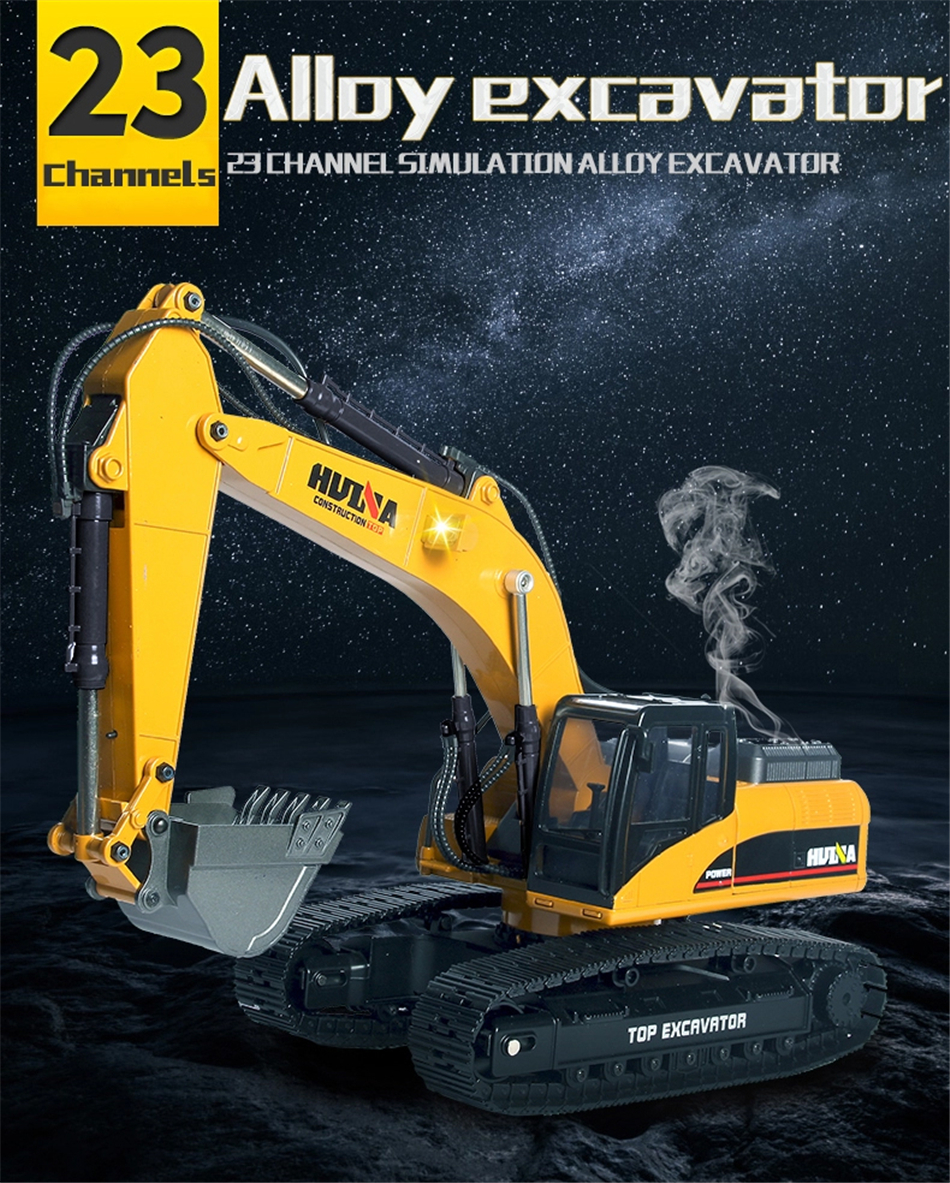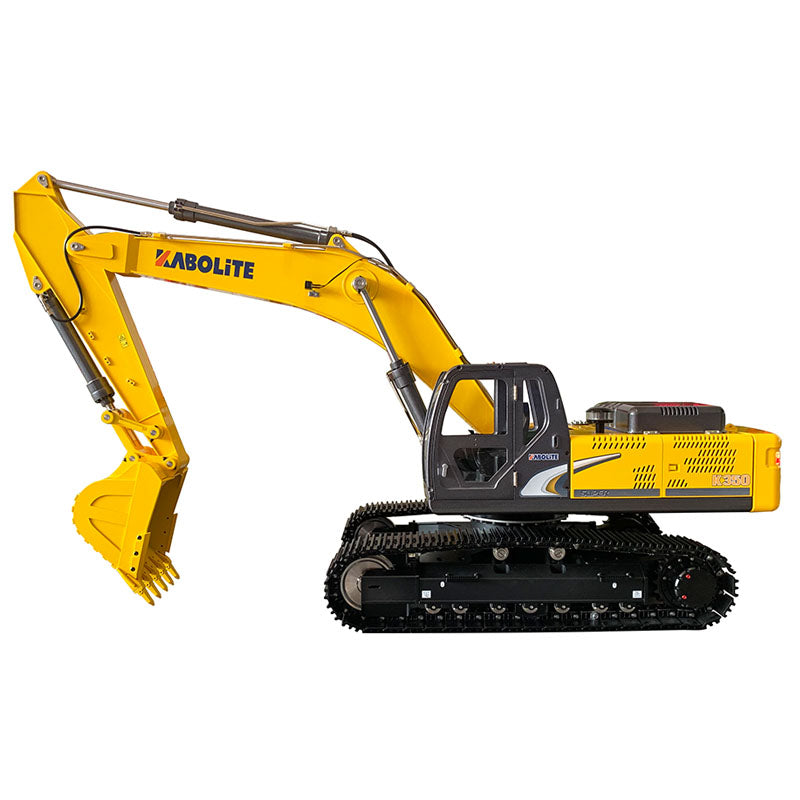Exploring the Features of a rc excavator for Enhanced Site Preparation
Understanding Exactly How Excavator Works and Its Effect On Effectiveness
Excavators play a vital duty in building and construction and mining operations, relying on a complicated interaction of hydraulic and mechanical systems. Their capability to perform a variety of tasks depends upon both their design and the modern technology integrated within. Comprehending these components can significantly influence operational efficiency and efficiency. As improvements continue to improve the industry, one have to consider exactly how these adjustments will certainly affect future practices and efficiency.
The Basics of Excavator Mechanics

The Function of Hydraulic Equipments in Excavators
At the heart of excavator operation lies the hydraulic system, which plays a crucial duty in powering the equipment's motions and functions. This system utilizes pressurized hydraulic fluid to transfer energy, making it possible for numerous actions such as excavating, training, and moving. By utilizing the principles of hydraulics, excavators can execute tasks with impressive precision and pressure, enhancing total functional efficiency.The hydraulic system contains crucial elements, consisting of valves, pumps, and cyndrical tubes, which work with each other to regulate the circulation and direction of the fluid. When the operator involves the controls, the hydraulic fluid is directed to specific cylinders, equating the driver's commands into physical motion. This mechanism enables for smooth and receptive activities, which are vital in building and construction and excavation environments. double e volvo rc excavator. The effectiveness of the hydraulic system straight affects the productivity and adaptability of the excavator, making it a vital component in modern excavation procedures
Secret Elements of an Excavator
Comprehending the vital parts of an excavator is vital for realizing just how this effective device operates. An excavator contains several considerable aspects, including the undercarriage, home, bucket, boom, and arm. The undercarriage gives stability and mobility, commonly including tracks or wheels to navigate different terrains. Your house consists of the engine and hydraulic systems, permitting the operator to control movement and power the equipment. The boom expands from the residence, enabling upright reach, while the arm links to the bucket, helping with excavating and lifting operations.Additionally, the taxi houses the driver, geared up with controls for specific maneuvering. Each of these components plays an essential function in the excavator's general performance, adding to its efficiency and effectiveness on construction sites. Recognizing these parts aids in preserving and optimizing excavator performance, making sure jobs are finished securely and effectively.
Accessory Adaptability and Its Advantages
Attachment adaptability is a necessary aspect of excavators, making it possible for drivers to switch over in between various tools tailored for certain jobs. This flexibility not only enhances work performance but also contributes to cost-effectiveness by decreasing the demand for several machines. Understanding the different sorts of accessories offered can substantially affect the total performance and performance of an excavator on job sites.
Kinds of Attachments
While excavators are primarily identified for their digging capabilities, their true flexibility depends on the wide array of accessories offered. These accessories improve the excavator's performance, enabling it to do numerous jobs past excavation. Usual attachments include containers (for excavating and scooping), hydraulic thumbs (for realizing materials), and augers (for piercing openings) Grapples are utilized for taking care of and moving particles, while rippers can separate tough surface areas. Various other specialized add-ons, such as plates and rakes, make it possible for excavators to adjust to particular job demands. This variety not just raises the maker's energy throughout various industries, consisting of landscape design, building, and demolition, yet likewise enables drivers to tailor their devices to meet details job demands successfully.
Enhanced Task Efficiency
Maximizing job performance is a primary advantage of using various excavator attachments. Various accessories enable an excavator to perform numerous tasks without requiring to switch devices, saving beneficial time and labor. For instance, making use of a hydraulic hammer can break concrete while a container add-on can excavate soil, making it possible for a seamless workflow. This convenience lowers downtime connected with tools changes and improves performance on-site. Furthermore, specialized add-ons improve precision in jobs such as grading or landscape design, resulting in better end results. The capability to adapt to numerous job demands not only simplifies operations however additionally reduces the demand for additional machinery, guaranteeing that tasks are completed quickly and properly. Overall, accessory convenience significantly contributes to increased task performance in excavation job.
Cost-Effectiveness and Versatility
Cost-effectiveness is a considerable benefit of utilizing flexible excavator attachments. These add-ons enable a single excavator to do multiple jobs, reducing the need for added equipment and labor - double e volvo rc excavator. By changing in between buckets, hammers, and grapples, drivers can take on various jobs, from digging to demolition, thus making the most of equipment utilization. This flexibility not just lowers functional expenses but additionally lessens downtime connected with changing tools. Furthermore, the ability to tailor excavators with specialized accessories boosts efficiency, as they can efficiently take care of diverse jobs according to job demands. In conclusion, the mix of cost-effectiveness and adaptability in excavator accessories contributes to boosted operational effectiveness and resource allotment in building and construction and excavation jobs

Advanced Modern Technology in Modern Excavators
Modern excavators are significantly furnished with sophisticated technology that transforms excavation processes. Automation improves procedures, while boosted gas effectiveness reduces functional expenses. Additionally, clever control systems enhance precision and safety and security, marking a significant advancement in excavation devices.
Automation in Excavation Processes
As excavation technology advances, automation has become an important element in enhancing effectiveness and accuracy on task sites. Modern excavators are furnished with advanced automated systems that promote tasks such as grading, excavating, and trenching with minimal driver treatment. These systems use sensing units, GPS, and artificial intelligence formulas to guarantee exact positioning and deepness control, click over here significantly lowering the margin for error. Furthermore, automation allows operators to concentrate on calculated decision-making rather than manual controls, bring about boosted productivity generally. Such advancements not just simplify workflows but also enhance safety and security by lessening human error in complicated operations. Consequently, the assimilation of automation in excavation processes stands for a considerable development in building technology, driving the industry in the direction of higher performance and efficiency.
Enhanced Gas Performance
Innovations in technology have also resulted in substantial improvements in fuel efficiency for contemporary excavators. Modern makers are outfitted with sophisticated engines that maximize power outcome while decreasing gas intake. These engines make use of cutting-edge combustion modern technologies, such as turbocharging and direct gas shot, to improve efficiency and effectiveness. Furthermore, light-weight materials in construction decrease general weight, permitting much less power expense during procedure. The introduction of variable speed controls allows operators to adjust engine efficiency according to specific tasks, additionally reducing gas usage. Therefore, these improvements not just lower operational expenses yet additionally add to environmental sustainability by decreasing exhausts. Generally, boosted gas performance in excavators is a crucial growth that bolsters productivity and financial viability in the construction market.
Smart Control Systems
While operators browse significantly intricate task websites, smart control systems in excavators have arised click as necessary devices for improving efficiency and precision. These advanced modern technologies utilize sensors and formulas to check different criteria such as tons weight, terrain problems, and operational efficiency. By instantly readjusting hydraulic features, clever systems enhance machine efficiency, leading to improved performance and minimized wear on parts. Additionally, operators gain from instinctive interfaces that give real-time comments and diagnostics, enabling educated decision-making. This assimilation of technology not only simplifies operations but additionally decreases human error, contributing to safer workplace. As the building market continues to advance, clever control systems will certainly play a crucial role fit the future of excavator performance and effectiveness.
Enhancing Functional Performance With Excavators
Excavators play an essential role in enhancing operational performance across numerous building and construction and excavation projects. Their flexibility enables for multiple tasks, consisting of training, digging, and product handling, which enhances process and decreases the need for extra devices. With powerful hydraulic systems, excavators can execute heavy-duty tasks with precision, substantially lowering the moment called for to full jobs. The integration of innovative technology, such as general practitioner and automated controls, further maximizes their operation, making it possible for operators to accomplish higher precision and lower product waste. Additionally, contemporary excavators are designed to take in less fuel and lessen emissions, adding to both cost savings and ecological sustainability. By making use of excavators efficiently, building teams can enhance performance, meet task due dates, and boost total site management. This multifunctionality and performance make excavators essential devices in the contemporary construction landscape.
The Future of Excavators in Building And Construction and Mining Industries
As the construction and mining sectors develop, the future of excavators is positioned for considerable improvement driven by technical development and changing functional demands. Advances in automation and expert system are improving excavator capacities, permitting enhanced precision and efficiency in operations. Autonomous excavators are arising, minimizing the need for human treatment and reducing the danger of accidents.Moreover, the combination of telematics and IoT modern technology makes it possible for real-time monitoring of device efficiency and predictive upkeep, enhancing uptime. Green designs, including electric and hybrid models, are getting traction, aligning with sustainability objectives within the industry.Additionally, using innovative products and lighter styles boosts fuel performance while preserving performance criteria. As these fads progress, excavators will certainly play an essential duty in satisfying the increasing needs for productivity and safety and security in construction and mining, ultimately transforming operational landscapes.
Often Asked Questions
Exactly How Do Weather Problems Affect Excavator Performance?

Climate conditions considerably influence excavator efficiency, as rainfall and mud can impede traction and stability, while extreme temperature levels may impact hydraulic systems. Operators needs to adjust to these variables to ensure optimal performance and security during operations.
What Safety Procedures Should Operators Comply With While Making Use Of Excavators?
Precaution for excavator operators consist of wearing ideal individual safety devices, carrying out pre-operation evaluations, making sure appropriate communication with ground personnel, keeping a safe distance from above hazards, and adhering to well-known operational protocols to stop accidents.
Just How Typically Should Excavators Be Maintained for Ideal Efficiency?
Excavators should be maintained regularly to ensure peak performance, generally every 250 operating hours or as defined by the producer. Regular checks improve reliability, protect against unanticipated break downs, and prolong the life-span of the devices.
What Is the Average Life-span of an Excavator?
The average lifespan of an excavator usually varies from 10,000 to 15,000 hours of procedure. Variables affecting long life consist of upkeep methods, operating problems, and the quality of the device itself, affecting general efficiency and efficiency.

Can Excavators Operate on Uneven Terrain Successfully?
Excavators can run efficiently on unequal terrain because of their expressed layouts and adjustable tracks. These attributes enable them great post to read to preserve security and traction, making it possible for efficient procedure in challenging environments frequently experienced in building and landscaping jobs. Each of these parts plays an essential role in the excavator's general capability, adding to its efficiency and effectiveness on building and construction websites. Optimizing job performance is a primary advantage of utilizing numerous excavator accessories. While drivers navigate increasingly intricate work websites, smart control systems in excavators have arised as essential devices for enhancing efficiency and accuracy. Excavators play a necessary duty in enhancing operational performance throughout different building and excavation projects. Developments in automation and synthetic intelligence are reshaping excavator abilities, allowing for boosted accuracy and efficiency in procedures.